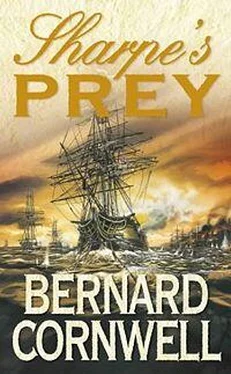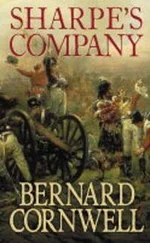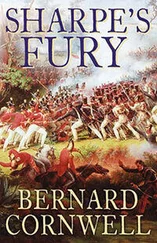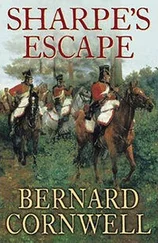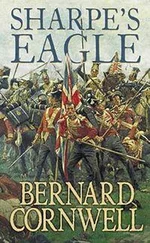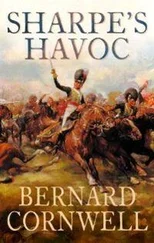Бернард Корнуэлл - Sharpe's Prey
Здесь есть возможность читать онлайн «Бернард Корнуэлл - Sharpe's Prey» весь текст электронной книги совершенно бесплатно (целиком полную версию без сокращений). В некоторых случаях можно слушать аудио, скачать через торрент в формате fb2 и присутствует краткое содержание. Год выпуска: 2001, ISBN: 2001, Издательство: Harper Collins, Жанр: Исторические приключения, на английском языке. Описание произведения, (предисловие) а так же отзывы посетителей доступны на портале библиотеки ЛибКат.
- Название:Sharpe's Prey
- Автор:
- Издательство:Harper Collins
- Жанр:
- Год:2001
- ISBN:0-00-225875-7
- Рейтинг книги:5 / 5. Голосов: 1
-
Избранное:Добавить в избранное
- Отзывы:
-
Ваша оценка:
- 100
- 1
- 2
- 3
- 4
- 5
Sharpe's Prey: краткое содержание, описание и аннотация
Предлагаем к чтению аннотацию, описание, краткое содержание или предисловие (зависит от того, что написал сам автор книги «Sharpe's Prey»). Если вы не нашли необходимую информацию о книге — напишите в комментариях, мы постараемся отыскать её.
Sharpe's Prey — читать онлайн бесплатно полную книгу (весь текст) целиком
Ниже представлен текст книги, разбитый по страницам. Система сохранения места последней прочитанной страницы, позволяет с удобством читать онлайн бесплатно книгу «Sharpe's Prey», без необходимости каждый раз заново искать на чём Вы остановились. Поставьте закладку, и сможете в любой момент перейти на страницу, на которой закончили чтение.
Интервал:
Закладка:
Barker moved northward a few paces and Sharpe broke cover and ran southward. Barker heard him, and that was what Sharpe wanted, for he half hoped Barker would try a long shot. Once the gun was discharged it would take too long to reload and Sharpe would be on the servant like a terrier onto a rat, but Barker was no fool. He held his fire and instead followed Sharpe in hope of getting close enough for the pistol not to miss.
Sharpe went to ground in black shadows between two low dunes. The fog was blanching the first hint of dawn and muffling the small sounds of the wind and waves. Barker had lost him again, though the servant had a rough idea of where Sharpe was and now crouched on the skyline. The man was no soldier, or else he would have sought the lower ground for at night it was impossible to see down into the hollows. A man could see upward against the sky, but not down. Sharpe watched the hulking servant, then raked his fingers through the sand and grass to come up with a scrap of wood and two pebbles that he flicked southward one after the other. They made tiny noises as they landed and Barker, hearing them, moved toward the small sounds.
Sharpe went back northward. He crept, feeling ahead of him to make sure he did not trample any stiff grass. He found two more pieces of wood that he hurled away into the misty dark, hoping to lure Barker farther south, and only when he had lost sight of the man did he stand and cross the dunes back to the beach. He needed to find the picklock, but it had vanished in the trampled sand about the chest. He searched quickly, sifting handfuls of sand, but he could not find it and suddenly he heard Barker returning. The servant had given up his hunt and was coming back to guard the gold so Sharpe abandoned the weapons locked in the chest and went back across the dunes.
He headed inland until he reached a damp vegetable field edged with a ditch. He moved northward now, following the ditch which was half silted with blown sand. A bird flew up from a nest, startling him, then he saw he had come to a rough track, deep rutted by cartwheels, that headed inland. He was about to follow it, then heard hoofbeats and so he scuttled back to the ditch and lay in its damp grass.
The hoofbeats sounded like a whole troop of cavalry, but Sharpe could see nothing in the soft fog. He lay motionless, the hat shadowing his face from the wan early light. Then he saw a shape in the whiteness, another, and suddenly there were a half-dozen horsemen in sight. They all wore long red jackets with pale-blue collars and cuffs. Their breeches were black, edged with white piping, and their hats were black bicornes, elaborately plumed with white feathers. Their long straight swords hung from sashes of yellow silk and suggested they were dragoons. A second group appeared, all of them going slowly because of the fog, and then a shabby cart materialized. It was pulled by a plodding pony and was hung with remnants of seaweed. Sharpe guessed the cart was normally used to fetch weed from the beach to use as fertilizer and now it had come for the gold.
The horsemen and the cart vanished onto the beach. Sharpe darted across the track and found shelter in another ditch. He heard muffled voices and thought he detected anger. But who was angry, and why? Had the dragoons captured Lavisser, or had they been sent by him? Sharpe raised his head, but could see nothing. He crawled inland, staying low so that he did not appear as a dark patch in the lightening fog. What the hell was he to do? The clink of a curb-chain made him lie flat again. The horsemen had evidently spread into the fog to search for him, but they were looking too far to the south. They called to each other, sounding oddly cheerful now, and Sharpe sensed they were a group of friends rather than a military unit. All were apparently officers, judging by the sashes, and none was shouting orders. They laughed as they kicked their horses through the wet soil of the vegetable field, then they were gone to the south and Sharpe kept crawling. Go inland, he thought, and find shelter. Find trees. Find anything that would hide him and then work out what to do. Maybe, he thought, he should just wait. A British army was supposedly coming to Denmark, but the thought of emerging from some barn or ditch to a welcoming committee of supercilious officers was more than he could bear. They would say he had failed again, but what else could he do?
The voices and hoofbeats sounded again and Sharpe dropped into the mud. He must have been closer to the track than he had thought, for he could hear the squeal and rumble of the cart. Then he heard Barker’s voice. He was apologizing, but his apology was cut short when Lavisser interrupted him. “It’s a pity, Barker,” the guardsman said, “but it’s not a tragedy. And what can he do to us? I quite liked the fellow, but he’s still an encumbrance and quite useless. Pitifully useless.”
Useless? Sharpe raised his head to see that Lavisser was wearing the Danish uniform. He must have gone back home to his grandfather, changed into the uniform, joined his waiting friends and so become wealthy. All in an hour or two. Then damn him, Sharpe thought. Damn him. He watched the cart and the cavalrymen fade into the fog.
Get to Copenhagen, he thought. He felt in his pocket and found the piece of paper that Lord Pumphrey had given him in Harwich. There was just enough light to read the elegant handwriting. “Ole Skovgaard, Ulfedt’s Plads,” it read, and Sharpe stared at it. Was that a name? Or an address? Then he guessed the comma meant that Ole Skovgaard was the man’s name and Ulfedt’s Plads was where he lived, and that, Pumphrey had said, was in Copenhagen, so get there fast. Be useful.
He pushed the scrap of paper back into his coat pocket, checked that Lavisser and the other horsemen were truly gone from sight, then stood.
And that was when the dragoon sprang the trap.
It was an old trick. The cavalrymen had left one horseman behind, reckoning that Sharpe would think himself safe when he saw the riders leave and so come out of hiding.
Which Sharpe dutifully did and the last dragoon, waiting by the dunes, saw the rifleman appear as a dark shape in the field.
The dragoon should have shouted immediately. He should have called his companions back, but he wanted all the credit for capturing the missing Englishman and so he drew his sword and raked his spurs back. Sharne heard the hooves, turned and saw the big horse being spurred but saw, too, that the horseman was right-handed, understood that the horse would therefore go to his own right and knew that the dragoon would lean from the saddle to chop with the sword, and knew, too, that there was no time to draw his own saber. Or perhaps he knew none of that, but instinctively realized it in the space of a heartbeat and understood how to react.
The cavalryman shouted, more to frighten Sharpe than summon his companions, but the horseman was too confident and too inexperienced. He believed Sharpe would stand like a scarecrow and be beaten down by the flat of his sword and the last thing he expected was for the rifleman to swing the heavy pack hard into the side of his horse’s head. The horse slewed away and the dragoon, already swinging his heavy sword, found his horse going one way while he was leaning the other. Lavisser had cautioned him that the Englishman was dangerous so he had intended to stun Sharpe with the weight of his heavy straight blade, but instead he flailed for balance. Sharpe let go of his pack, seized the dragoon’s sword arm and simply tugged. The man yelped as he was jerked from the saddle, then the breath was thumped out of him as he fell into the rnud. He yelped again as Sharpe dropped onto his belly. “Bloody fool,” Sharpe said.
The horse, shaking its head, had stopped. There was a pistol bolstered on its saddle.
Читать дальшеИнтервал:
Закладка:
Похожие книги на «Sharpe's Prey»
Представляем Вашему вниманию похожие книги на «Sharpe's Prey» списком для выбора. Мы отобрали схожую по названию и смыслу литературу в надежде предоставить читателям больше вариантов отыскать новые, интересные, ещё непрочитанные произведения.
Обсуждение, отзывы о книге «Sharpe's Prey» и просто собственные мнения читателей. Оставьте ваши комментарии, напишите, что Вы думаете о произведении, его смысле или главных героях. Укажите что конкретно понравилось, а что нет, и почему Вы так считаете.
